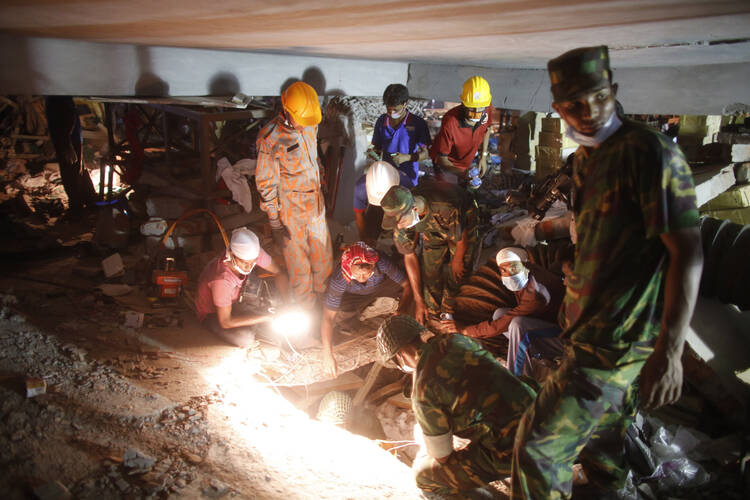Sharing the Burden
Workers in the ready-made garment industry in Bangladesh have seen more than their share of tragedy over the past year: 112 perished in a factory fire last November; the collapse of the Rana Plaza building in April took over 1,100 lives; and at least 10 more were lost in a fire on Oct. 8. Outrage over the appalling conditions in factories that supply Western brands has led to protests in Bangladesh and international commitments to improve safety. There are now signs that both movements are beginning to bear fruit.
Following a wave of strikes that hit roughly a fifth of the workshops, an independent wage board is poised to increase the minimum wage (currently $38 a month) by between 50 and 80 percent. And on Oct. 21 the government of Bangladesh and the International Labor Organization launched a $24 million initiative that will provide for the fire safety and structural integrity inspections of factories, as well as rehabilitation and training for victims of previous disasters and better protection for workers seeking to unionize.
Ensuring a just wage and safe working conditions is a responsibility at every step of the supply chain—from local employers to the shareholders of companies in the United States. Retailers like H&M have called for annual wage increases and expressed their willingness to defray the cost to factory owners. Major European and American brands have pledged funds for ongoing safety monitoring and repairs. It is incumbent on consumers, used to prices that hide the true cost of the clothing they buy, to reward those who live up to their obligation to put persons before profit.
A Civil Politician
Thomas S. Foley, the eloquent former speaker of the House, died on Oct. 18 following complications from a stroke. He was 84. Mr. Foley, a Democrat, represented eastern Washington State in Congress for 30 years, from 1964 to 1994, and lost his seat when Republicans, led by Representative Newt Gingrich of Georgia and fueled by the Contract With America, gained control of the House.
The well-spoken, courtly Mr. Foley attended Gonzaga Prep and Gonzaga University in Spokane, Wash., where, not surprisingly, he and his debate partner won the National Debate Championship in 1948. Despite Mr. Foley’s patrician bearing, he mixed well with his rural constituents. He loved riding horseback and getting his boots dirty in the rolling hills of the Palouse country, south of Spokane. Mr. Foley became speaker in 1989 after a bitter fight, led by Mr. Gingrich, to oust Representative Jim Wright, a Democrat from Texas, for alleged ethics violations. The new speaker quickly appealed to “our friends on the Republican side to come together and put away bitterness and division and hostility.” He won high praise from all sides for his common courtesy and universal fairness. He explained that he was Speaker of the whole House, not just one party or one faction.
Dan Evans, a former Republican governor of Washington, remarked, “[Tom] was an unusually civil politician in an increasingly uncivil arena.” Mr. Foley’s example provides a strong commentary on the unsavory divisions in Congress today and its instinct to deepen the divide rather than build bridges. He eschewed partisan advantage in order to advance the well-being not only of his own constituents but of every region of the country.
Argentina’s Future
The political reign of the Kirchners in Argentina appears to be coming to an end as President Cristina Fernández de Kirchner deals with health problems and her party faces challengers in the midterm elections. Mrs. Kirchner was elected to her second term in 2011. She followed her husband, Néstor Kirchner, who held the presidency from 2003 until 2007 and died suddenly in 2010. Last month, officials announced that President Kirchner had sustained a head injury after a fall. She underwent surgery in October and has been told to scale back her activities.
Mrs. Kirchner’s Front for Victory party was widely expected to lose seats in the elections held on Oct. 27. The elections have been portrayed as a dress rehearsal for 2015, when the people of Argentina will most likely elect a new president. Sergio Massa, a former member of the Kirchner cabinet who broke with the president, and Daniel Scioli, the governor of Buenos Aires Province, are seen as top contenders for the post.
Néstor Kirchner assumed office at a time of financial turmoil, and his supporters credit him with guiding the growth of the country’s economy. Critics fault him and his wife for failing to capitalize on Argentina’s recovery and for presiding over a political culture that is polarized and, in some cases, corrupt. In the coming years, Argentina will need pragmatic leaders willing to work with diverse groups in order to set the country on a more promising path. Inflation remains a problem and will need to be dealt with in order to lure foreign investment. If Argentina wishes to attain the economic prosperity and international favor enjoyed by its neighbors in Brazil and Chile, the next few years will be crucial.








